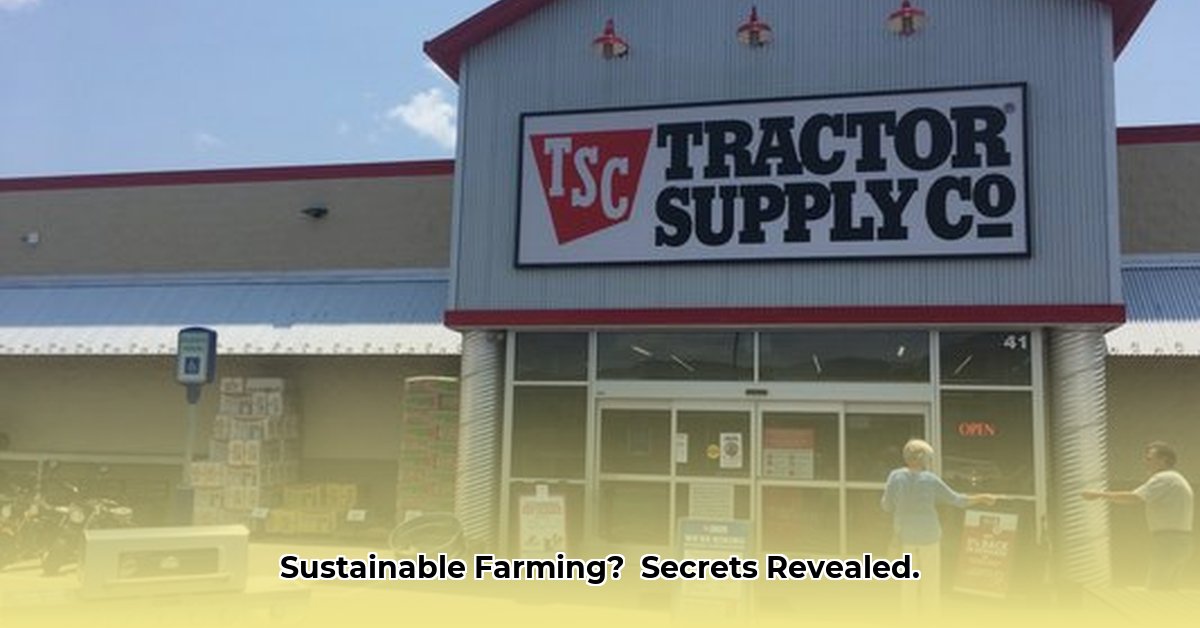
Understanding Easley Tractor Supply's Role in Sustainable Agriculture
Easley Tractor Supply (ETS) serves as a vital resource for farmers in the Upstate South Carolina region, providing essential supplies for both small-scale gardeners and larger agricultural operations. However, the extent to which ETS directly contributes to truly sustainable agriculture requires careful examination. While ETS offers the basic tools for farming – seeds, fertilizers, tools, etc. – its impact on sustainable practices is more nuanced. How can farmers in Easley ensure their farming is environmentally and socially responsible? For sustainable farming techniques, check out this guide on chicken tractors.
How does ETS's supply chain impact the environmental footprint of local farming? Are the fertilizers and pesticides offered the most earth-friendly options available? What about the packaging’s recyclability? These crucial questions highlight the need for a more holistic approach to sustainable agriculture in Easley. While ETS provides the necessary resources, the responsibility for implementing truly sustainable practices rests ultimately with the individual farmer and the broader agricultural community.
Taking Stock: A Comprehensive Assessment of Sustainable Practices
This localized case study analyzes ETS's current contributions to sustainable farming and identifies areas for improvement, focusing on key practices:
Key Aspects of Sustainable Farming Practices
| Aspect of Sustainable Farming | Current ETS Practices | Potential for Improvement |
|---|---|---|
| Fertilizer Use | Primarily conventional chemical fertilizers are stocked. | Expand organic and biodynamic fertilizer options. Conduct in-store workshops on responsible fertilizer use. |
| Pest & Disease Management | Conventional pesticides are widely available. | Offer more Integrated Pest Management (IPM) resources (e.g., neem oil, beneficial insects). |
| Water Conservation | Limited selection of water-efficient irrigation supplies. | Broaden the range of drip irrigation systems and drought-resistant seeds. Offer workshops on water conservation. |
| Packaging & Waste Reduction | Mostly conventional packaging. | Transition to more sustainable and recyclable packaging. Promote reusable containers and in-store recycling. |
| Supply Chain Transparency | Limited public information on sourcing and sustainability. | Increase transparency and clearly label products indicating sustainable sourcing and manufacturing processes. |
Actionable Steps for a Greener Future
Progress toward a more sustainable agricultural landscape in Easley requires concerted effort from multiple stakeholders. Here's a framework for actionable steps:
1. For Easley Tractor Supply:
1.1 Enhance Product Labeling: Clearly label sustainable products (e.g., "organic seed," "non-GMO seed"). This improved labeling will help customers make informed choices.
1.2 Gather Customer Feedback: Conduct regular surveys or focus groups to pinpoint customer demand for sustainable products. This feedback-driven approach ensures ETS aligns its offerings with customer needs.
1.3 Partner with Local Producers: Prioritize locally sourced, sustainable products whenever possible. This boosts local economies and showcases the value of sustainable practices.
1.4 Invest in Employee Training: Equip staff with the knowledge to advise customers on sustainable agriculture best practices.
2. For Local Farmers:
2.1 Maximize Resource Efficiency: Optimize yield while minimizing waste by applying sustainable agricultural techniques, increasing the return on investment from ETS purchases.
2.2 Communicate Needs: Inform ETS about your demand for specific sustainable products. This collaborative approach will drive the availability of desired items.
2.3 Adopt Diverse Farming Practices: Explore techniques like cover cropping, crop rotation, and composting to enhance soil health and environmental responsibility.
3. For the Easley Community:
3.1 Promote Sustainable Practices: Share information about sustainable farming through community workshops, demonstrations, blogs, or newsletters to raise awareness and drive positive change.
3.2 Advocate for Policy Change: Support local initiatives promoting sustainable agriculture, amplifying your voice in the pursuit of a greener future.
4. For Tractor Supply Corporate:
4.1 Implement Comprehensive Sustainability Initiatives: Adopt a company-wide commitment to sustainable practices across all stores, ensuring consistent transparency and environmental responsibility.
4.2 Invest in R&D: Dedicate resources to develop innovative, sustainable agricultural products. Collaboration with universities and researchers can accelerate innovation and implementation.
4.3 Promote Transparency and Accountability: Publicly report on sustainability goals and progress, fostering trust and inspiring further action.
The Path Forward: Collaboration for a Sustainable Future
Easley Tractor Supply occupies a critical position within the local food system. Its capacity to actively contribute to a truly sustainable future is substantial. By prioritizing clearer labeling, expanding the range of sustainable products, enhancing supply chain transparency, and fostering strong community engagement, ETS, local farmers, and the Easley community can collaboratively cultivate a more sustainable and resilient agricultural landscape. The future of Easley's agriculture relies on this crucial collaborative effort. Remember that sustainable agricultural practices are constantly evolving; staying informed and adaptable is vital for long-term success.